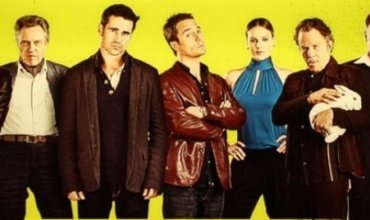SPOTLIGHT is a well-made, almost old-fashioned film. The subject that is at the heart of the story is serious and current. The craftsmanlike approach to the film-making and the mature approach to the story-telling feels like a throwback to twenty or thirty years ago. If someone had told me the movie was the creation of a rejuvenated Ron Howard, I could believe it. The actual director of SPOTLIGHT is Todd McCarthy. He has made five features and shown a talent for character drama (THE STATION AGENT, WIN WIN), but his latest film is still something of a step up. The cast has significant acting heft; Mark Ruffalo, Liev Shreiber, Rachel McAdams, John Sattery and Michael Keaton put in a solid team effort. This ensemble-playing, echoes the work ethic of the journalists they are portraying, The Boston Globe’s Spotlight team.
The story begins in 2001 with the arrival of a new editor. Marty Baron (Shreiber) isn’t Boston born and bred like most of his staff. He doesn’t yet understand the traditions of his new city nor the culture of his new workplace. The Spotlight journalists have the freedom and resources to work on stories of their own choosing. The head of the team Walter “Robbie Robinson” (Keaton) has won this right through years of successful investigative reporting. Baron believes Spotlight needs to drop their current leads and look into the case of John Geogahn, a Boston priest accused of child abuse. There are claims that rather than turning the priest over to the police, the Church moved him from parish to parish and he committed his crimes time and again. It is further claimed that this happened with the full knowledge of Cardinal Law, the Archbishop of Boston.
In short order, Baron finds himself invited to chat with the Archbishop. Law claims to be offering the newcomer the assistance of the Church. Baron understands that he is actually being pressured to maintain the status quo and not ask awkward questions. This incident has the opposite effect on Baron and he pushes the Spotlight team to investigate the Geoghan matter further. At this point, there is still some reluctance on the part of some team members because they are Boston Catholics who are used to deferring to the power of the Church. It is precisely because Baron is a non-Catholic outsider, that he sees the Geoghan case for what it is–a powerful organisation protecting itself and allowing a heinous crime to go unpunished.
The story focusses on the glacial, painstaking journalism the Spotlight team engages in. When they begin, they think they are investigating one Boston priest, as months pass, they discover this pattern of abuse and cover-up is occurring all over the state with many more clergymen. Fifteen years down the track, we the audience, know how much larger and how much worse the story would become. SPOTLIGHT presumes we have a memory of recent history and is respectful and appropriate in showing the pain and suffering of the abuse survivors. It is presented in several scenes, but is not dwelt upon. Other dramatic features like PHILOMENA (2013) and ORANGES AND SUNSHINE (2010) go into this emotional territory, as do the harrowing documentaries DELIVER US FROM EVIL (Amy Berg-2006) and MEA MAXIMA CULPA (Alex Gibney-2012). Those films drove me to tears. This one did not. This is in no way a criticism. McCarthy has staked out different territory here.
SPOTLIGHT is about seeking justice for society’s powerless by reporting the truth. Right now, no one can tell what form journalism will take in the next twenty years. Can it exist if there is no one to pay for it? McCarthy’s movie makes the case that we must find the resources to pay for the journalism that makes the powerful accountable for their actions. This film may not draw your tears, but there is a good chance you will feel angered by the portrayal of the Church’s institutional arrogance and its blatant disregard for the lives and rights of children.
SPOTLIGHT is in Australian cinemas now. It runs for 129 minutes. (8/10)


